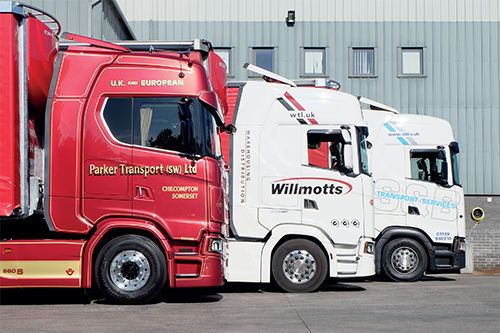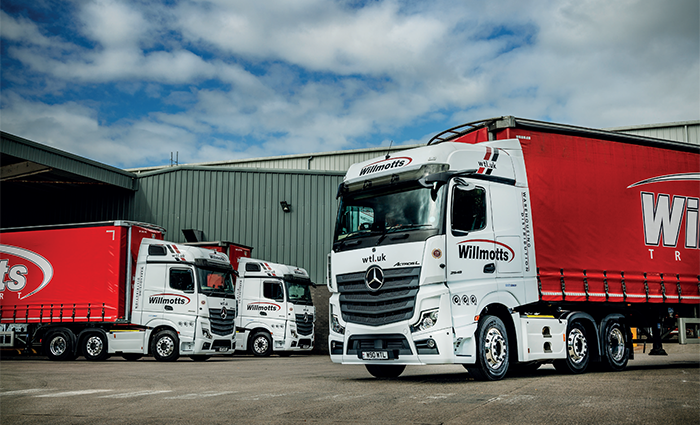From A to B: the commercial journey behind Willmotts Transport
Part of the Stotts Group, Willmotts Transport (Willmotts) is one of the largest privately owned distribution companies in the south western region of the UK. Founded in 1918, the firm was originally established in Wells, Somerset, but moved to a new site near Shepton Mallet in the 1980s, where it remains today. Group Managing Director, Andy Stott, has overseen much of this expansion, and in the last ten years Willmotts has grown significantly. We recently caught up with Dan Gray, Managing Director at Willmotts, to find out more.
Indeed, change has become a fundamental part of the distribution company’s growth strategy. For instance, Willmotts now operates multiple warehousing sites in Somerset, including Shepton Mallet, Radstock, Glastonbury, and Frome, as well as operating other depots in Bristol, Bridgwater, Devizes, Warwick, and Sheffield. A 125,000-square-foot warehouse in Radstock was purchased in 2021, but has already been rapidly filled, demonstrating the incredible rate of growth that Willmotts is experiencing. The company has therefore further augmented its warehouse capacity, recently constructing a new and fully-racked 20,000-square-foot site in Waterlip, near Shepton Mallet.
In the last five years alone, the firm has expanded from a relatively modest portfolio into over 400 active accounts, ranging from large multinational organizations to small enterprises and start-ups. Further, Willmotts has secured long-term contracts with numerous, prestigious brands, demonstrating external confidence in the company’s ability to support and enhance the competitiveness of its working partners.
“Central to our growth has been continued investment in our vehicles, sites, and warehousing facilities to support our customers’ requirements as well as the upskilling of our employees,” notes Dan. “This has become even more important since the complexity and range of our services has dramatically increased over the last few years.
“Very early on, we acquired BRCGS certification, which is now maintained across four sites, as well as certification from the Soil Association and both ISO9001:2015 and ISO14001,” he goes on. “This gives customers the reassurance of independent quality assessment with regards to our professional handling of both food and non-food products.”
Dan took over the reins as Managing Director in 2022 and is focused on driving further strategic development within the business, zeroing in on supporting local and national food, drink, Fast-Moving Consumer Goods (FMCG), and packaging manufacturers to support pre- and post-production warehousing and distribution requirements.
Leading a company is no easy feat, especially during the turbulent post-pandemic period. As Dan explains: “Along with practically every transport operator in the country, in the last 12 months we have experienced an acute driver shortage, which threatened to leave some of our trucks parked up. With fewer large trucks on the road, much distribution was diverted into networks, leading to an excess of network freight volumes; the network infrastructure simply could not cope.
“It was the perfect storm,” he states. “Yet, quite rightly, it led to a necessary review of driver salary packages, substantially enhancing their personal sense of worth within the profession. Reflecting back on that time, we are incredibly grateful for the loyalty many of our drivers showed. In the end, employee retention was good and our customer base remained stable.
“We believe that running the newest, premium equipment is not only environmentally sound and a good advertisement for our customers, but, particularly in a difficult labor market, has also helped us to attract and retain our driving workforce,” continues Dan. “To secure new business, differentiation from competitors is crucial, and this is most readily achieved with strong branding; however, much new business comes from recommendation. The requirements of the food, drink, FMCG, and packaging sectors are very specific; customers are looking for food safety processes, traceability, and reliability in a fast-moving and demanding environment, as well as scalability to cope with seasonal fluctuations. Our growth has enabled the company to develop more sophisticated logistics and IT solutions, building a bank of expertise and resources that puts us in a better position to secure new contracts.”
 Since navigating that perfect storm, Willmott has continued to grow organically; however, a key part of the firm’s recent expansion is the result of the acquisition of Parker Transport by Stotts Group in June earlier this year. Indeed, the Group, which also includes bulk transport specialists S&B Transport Services, operates more than 150 vehicles and covers 400,000 square feet of warehousing space across eight locations.
Since navigating that perfect storm, Willmott has continued to grow organically; however, a key part of the firm’s recent expansion is the result of the acquisition of Parker Transport by Stotts Group in June earlier this year. Indeed, the Group, which also includes bulk transport specialists S&B Transport Services, operates more than 150 vehicles and covers 400,000 square feet of warehousing space across eight locations.
“The acquisition has certainly increased the strength and depth of our resources and capabilities,” Dan asserts. “We have focused on strengthening our marketing and digital branding, and forging better, long-term alliances with local manufacturers. Combined with our technical expertise, robust facilities, and growing vehicle fleet, the move has enabled us to attract new business and win a number of major new contracts within the last 12 months.
“Despite extended lead times, our vehicle renewal program has remained in motion; ten new trucks and 12 trailers have joined the fleet, and we are continuously looking to expand,” he adds. “Many of the trailers are Willmotts branded, but some have been liveried for customers. In fact, two examples feature The Lily Foundation, an important charity fighting mitochondrial disease that we are supporting, which have created a lot of interest.”
Willmotts considers the practice of good corporate social responsibility an essential trait, assisting an array of humanitarian aid services in Ukraine by transporting essential medical supplies and hospital beds to the border. Another aspect of the geopolitical crisis – the knock-on economic impacts – cannot be ignored.
As Dan notes: “The current economic climate is very challenging; operational costs are still rising exponentially. However, as in the past, we are well placed to weather the storm, and remain confident that we can provide a competitive offer and add tangible value to our customers’ commercial operations, which will put us in a good position to maintain growth going forward.
“We see our service as an essential component of the UK economy,” he concludes. “As we enter the pending recession, it is undoubtedly disappointing that the government has not gone far enough to reduce the costs of doing business and stem the upward trend in prices. In common with most other logistics operators, we would welcome more help with fuel duty and energy costs. That being said, we remain committed to maintaining and developing the business, enabling us to provide intelligent and sustainable one-stop solutions for a variety of manufacturers.”
